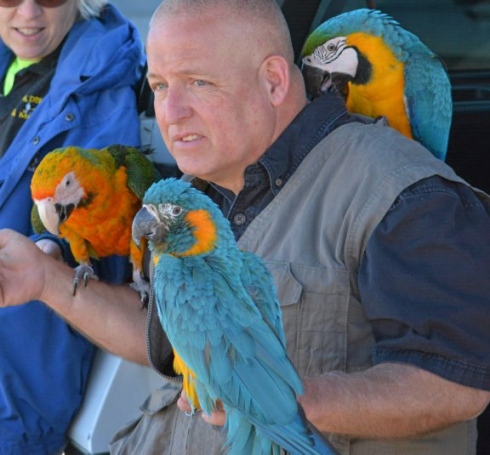Change to law would let owners keep endangered birds
 Tuesday, March 25, 2014 at 0:38
Tuesday, March 25, 2014 at 0:38  Buddy Waskey of Colonial Heights is shown with three of his birds. On his left hand is a blue-throated macaw. A blue and gold macaw named Mikhail rests on his back and on his right arm is a camelot macaw named Cosmo.COLONIAL HEIGHTS - When the East Wings Freeflight Club meets, an array of green, gold, blue and red feathers become a blur as macaws cut through the air at the club's Blackstone meeting place. The six members of East Wings gather to let these exotic birds stretch their wings.
Buddy Waskey of Colonial Heights is shown with three of his birds. On his left hand is a blue-throated macaw. A blue and gold macaw named Mikhail rests on his back and on his right arm is a camelot macaw named Cosmo.COLONIAL HEIGHTS - When the East Wings Freeflight Club meets, an array of green, gold, blue and red feathers become a blur as macaws cut through the air at the club's Blackstone meeting place. The six members of East Wings gather to let these exotic birds stretch their wings.
But a shocking blue bird named Pretty Girl wouldn't be able to continue to as a part of the flock if it weren't for an expected change to Virginia law coming from this legislative session.
Pretty Girl is a blue-throated macaw and, according to the existing law, owning her as a pet is illegal because she is endangered. State law prohibits Virginia residents from owning non-native domestic pets listed on the U.S. Fish and Wildlife Service endangered species list.
U.S. law doesn't prohibit all ownership of animals on the list, but prohibits participating in the transport of endangered species for interstate or international purchase or sale.
 A blue-throated macaw flies through the air.A person registered with the U.S. Fish and Wildlife Service may get a permit to buy and sell, within the U.S., non-native endangered animals born in captivity. The purpose must be to increase population growth of the species.
A blue-throated macaw flies through the air.A person registered with the U.S. Fish and Wildlife Service may get a permit to buy and sell, within the U.S., non-native endangered animals born in captivity. The purpose must be to increase population growth of the species.
Blue-throated macaws were added to the endangered species list Nov. 4, 2013.
Colonial Heights resident Lewis "Buddy" Waskey, a member of East Wings whose friend owns Pretty Girl, decided to take action to change the law to allow the birds of East Wings to continue to soar in Virginia air.
Waskey approached state Sen. Steve Martin, R-Chesterfield, about proposing legislation to change the law. After researching the cause, Martin patroned Senate Bill 50, which is awaiting Gov. Terry McAuliffe's signature.
Waskey said a main reason for adding animals to the endangered species list is smuggling, which isn't an issue for the blue-throated macaw.
"The smuggling in developed countries is like zero. It just doesn't happen," he said. "People in the United States don't want wild-caught birds."
Waskey said the blue-throated macaw hasn't been imported since 1992.
East Wings member Sharon Fassold said not allowing ownership of the blue-throated macaw hampers efforts to grow wild populations.
"There are people trying to breed them to reintroduce them to the wild in their native countries and they cannot even do that," Fassold said.
According to the U.S. Fish and Wildlife Service website, there are estimated to be fewer than 500 blue-throated macaws remaining in the wild and the population continues to decrease. The main reason for the decreased population is loss of nestlings due to competition for nest sites and the macaws falling prey to larger birds.
Blue-throated macaws are native to a small area in Bolivia and can live as long as 60 years.
The U.S. Fish and Wildlife Service is considering adding other macaws to the endangered species list, including the great green macaw, the hyacinth macaw, the military macaw and the scarlet macaw.
 Ara glaucogularis - Blue-throated Macaw | in
Ara glaucogularis - Blue-throated Macaw | in  Legislation
Legislation 
